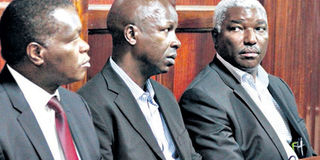Ex-envoy denies being 'obsessed' with Tokyo embassy plot

Former Foreign Affairs PS Thuita Mwangi (right), former Kenya's ambassador to Libya Anthony Muchiri (centre) and the former charge d'affaires at Kenya Embassy in Tokyo Allan Mburu in a Nairobi court in the past. Mr Thuita Mwangi has accused the prosecution of deliberately delaying the conclusion of his trial. FILE PHOTO |
A former ambassador Thursday denied he was “obsessed” with a vacant plot in Tokyo which the host country wanted to sell to the government prior to the controversial purchase of a chancery at an alleged exaggerated price.
Mr Dennis Awori, the former Kenya ambassador to Japan was testifying in a case in which the Former Foreign Affairs PS Thuita Mwangi is charged alongside two former envoys Anthony Muchiri and Allan Mburu in connection to the purchase of the Kenya embassy in Tokyo.
He swore he had no personal interest in the undeveloped plot he had identified for the government and further denied chairing a high profile negotiation meeting on January 16, 2009 between government officials and the land owner.
“We had lunch with Senator Tetsuro Yano and later I introduced the Kenyan team to the landlord and left, it was a Friday...I went to attend to other business,” he said.
But a defence lawyer produced minutes of a wrap-up meeting indicating his presence held on January 16, 2009 which the witness said he was not aware of as the one he knew was held on January 17, 2009.
Mr Wilfred Nderitu went ahead to give the details of the meeting including a verbatim quote he attributed to the former ambassador while introducing a Kenyan team for negotiations over the property but still he denied knowledge of the alleged conversation.
“I put it to you that you were present and in fact you told the landlord to meet the team from Nairobi and acknowledge the serious intent on purchasing his plot and to allay his fears,” Mr Nderitu said.
Mr Awori explained that he identified the plot in December 2005 and after valuation and negotiation settled at a buying price of 1.09 billion Japanese Yen an equivalent of Sh657.8 million but he was hard pressed to account for why the plot was not valued by professionals. He said he thought it would not have any additional value.
He confessed that he had requested that Sh1.2 billion be set aside for the purchase of embassy buildings and that during a revised budget an additional Sh3 million was pumped in for the purchase of the chancery and ambassador’s residence.
“Such funds could not be used for purchasing an undeveloped property,” the ‘witness said. He said he was aware parliament had approved the funds for the purchase of the building and not the plot.
Asked whether the government got value for the money it spent on buying the embassy which had been “tailor-made” to Kenyan specifications, the witness answered in the affirmative adding that he was aware of previous interests in acquiring the property. “In fact I made a statement that there was no loss of Sh1 billion as had been reported in the media,” he said.
Mr Awori said the plot he wanted the government to buy was “a hot-cake due to its proximity to international schools and convenient distance to the CBD and that embassies were struggling to get a slice of it.”
On Thursday, the former ambassador admitted that his name was still in use in bank accounts in Tokyo as a signatory long after his retirement. He also admitted having authored “fraudulent letter” purporting that his in-brother law was an embassy employee to facilitate the issuance of a visa.
The court was also treated to a disclosure of an excess of Sh8.5 million as insurance claims against the ambassador’s property purported to have been burnt in a fire at the chancery although the fire broke out after he had left Japan and his belongings shipped back.
He said he appended his signature to the insurance claim without reading the details which included clothes, shoes and curtains authored by a Mr John Njeru Nyaga although to “my knowledge the property had been shipped back to Kenya.” Hearing continues.




